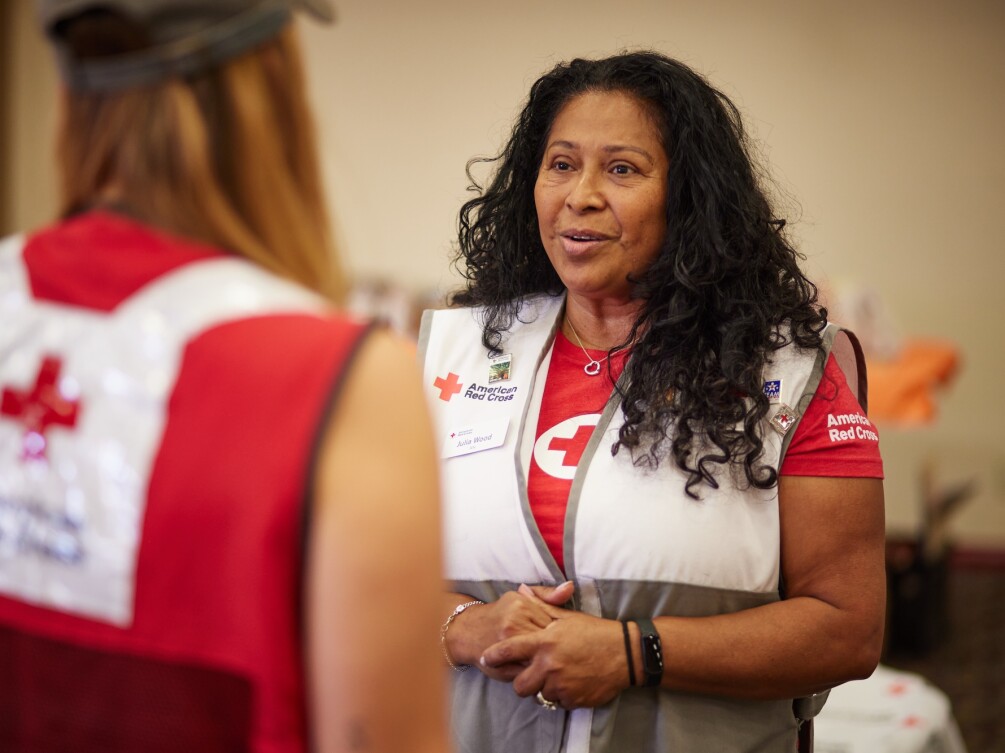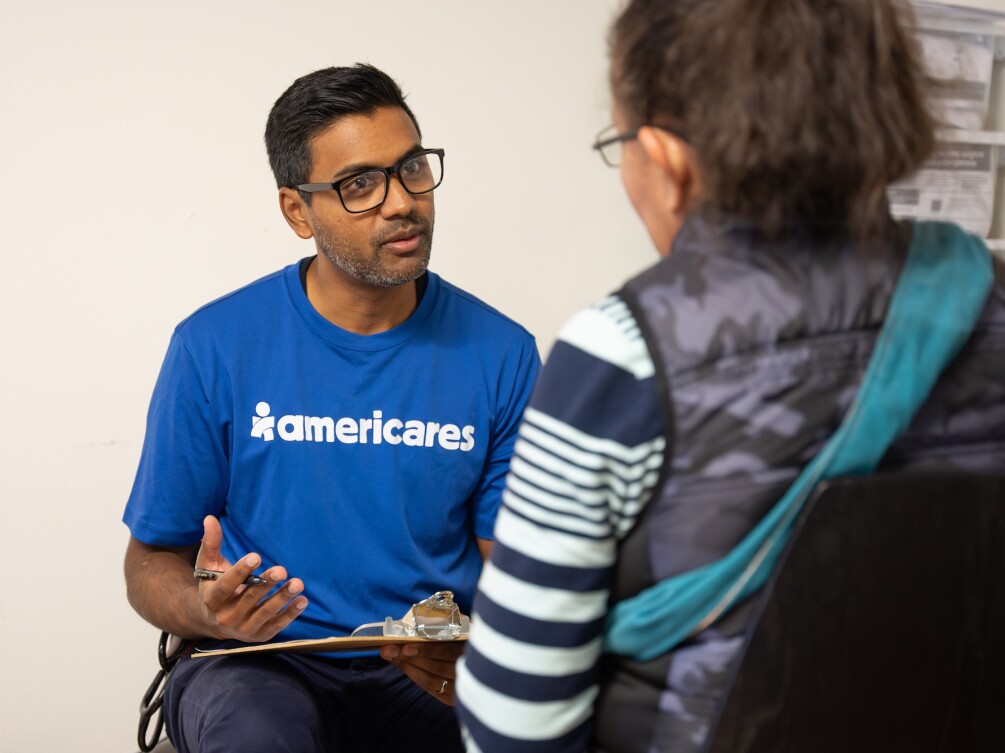When disasters strike, people look for safety, shelter and care. Health workers and first responders are the ones who step forward—providing care, delivering medicine and offering reassurance to families in need.
But in those moments, health workers themselves need support to serve their communities, work that begins long before a storm makes landfall and continues after the news coverage fades.
During September, we mark National Preparedness Month, reflecting on the year-round work that enables effective disaster response. Through J&J CareCommunity, our new social impact platform from Johnson & Johnson and the J&J Foundation, we are providing support to the health workers who are responding to natural disasters, strengthening communities’ ability to withstand and recover from disasters.
As part of this comprehensive approach, the J&J Foundation has committed $1 million to Americares to improve readiness for and enable rapid response to disasters worldwide by providing support for frontline health workers and local health systems. Combined with deepening collaborations with Heart to Heart International and the American Red Cross, we’re helping equip, support and care for health workers and communities when disasters occur and through the long road of recovery.
Preparedness in action
Disaster response starts with preparedness. Together with Heart to Heart International, Johnson & Johnson, alongside the J&J Foundation, is equipping health workers with emergency preparedness backpacks specifically designed to provide frontline responders with personal protection, sustenance and critical tools to ensure they can continue caring for others.
In Tampa, Florida, Johnson & Johnson employees gathered at a recent J&J CareCommunity employee volunteer event to pack backpacks for the Homeless Empowerment Program and Crisis Center of Tampa Bay, preparing resources for health workers in their own community in preparation for hurricane season. Each backpack includes first aid supplies, protective gear, essential tools and handwritten notes of encouragement from J&J employees.
“Through the support of the Johnson & Johnson Foundation, our healthcare worker preparedness backpacks allow us to stand alongside those who sacrifice so much to care for their communities,” said Heather Lee, Vice President of Development at Heart to Heart International. “This support enables us to be there not only in the aftermath of disaster, but also beforehand, helping healthcare workers not just respond and recover, but prepare and prevent, ensuring they can continue their lifesaving work when it matters most.”
By ensuring health workers have immediate access to the tools they need to protect themselves while caring for others, we prepare them to reach more lives when every moment counts.
Enabling swift response
When disasters unfold, communities need immediate relief.
The American Red Cross responds to more than 65,000 disasters of all sizes each year—providing shelter, hot meals, emotional support and resources to aid recovery. Johnson & Johnson Foundation’s membership in the Disaster Responder Program helps the American Red Cross maintain critical systems and supplies in place before the first shelter opens or volunteer arrives. This pre-investment in disaster relief ensures that Red Cross volunteers have the resources to bring hope to communities and help rebuild.

During the Southern California Wildfires response in September 2024, a registered nurse speaks to another volunteer about the importance of having nurses in Red Cross shelters to support clients. These volunteers, who are trained health care workers, help assess health needs, provide, or assist with care as needed, and replace medications, supplies and equipment that may have been lost or destroyed during the disaster. (Photo by Jaka Vinsek / American Red Cross)
“Having been a frontline caregiver for 50 years, I know the importance of medical readiness. Because of the trust we have earned, people in need know that the Red Cross will be there for them, often at a moment’s notice,” said Dr. Linda Fahey, Chief Nurse for the American Red Cross. “Disaster Responder members like the Johnson & Johnson Foundation make our service possible. The Foundation’s pre-investment enables the Red Cross can recruit and train volunteers, stock supplies, fuel vehicles and meet medical needs. Pre-planning and pre-investment are how we provide compassionate care and hope in times of crisis.”
Complementary to this, with support from Johnson & Johnson Foundation, Heart to Heart International delivers hygiene kits to displaced families, addressing critical gaps that emerge when infrastructure is disrupted.
Together, this rapid response helps stabilize communities in crisis, creating the immediate support that allows health workers to focus entirely on providing lifesaving care.
Supporting recovery and resilience
From the immediate disaster to when the news cameras leave, health workers face challenges. While helping others who are processing trauma and loss, they often struggle themselves and can experience compassion fatigue and survivor’s guilt that can prevent them from seeking the support they need.
The J&J Foundation’s $1 million grant to Americares helps address this critical gap, supporting the mental health and wellbeing of health workers during and after disasters. Recognizing the unique layer of distress they face, Americares provides health workers responding to disasters with psychological first aid, crisis stabilization, coping support and specialized training in stress management and resilience building.

Americares staff member Prabu Selvam (left) consults with Catalina, a resident of Swannanoa, North Carolina, at an Americares Mobile Medical Unit deployed to local nonprofit Bounty & Soul. The unit delivers critical care to communities impacted by Hurricane Helene with support from the Johnson & Johnson Foundation. (Photo by Mike Demas)
“We didn’t just get the mental health support in the wake of the storm, we’re getting the mental health support now,” said Rachel Sossoman, president and CEO of Mercy Urgent Care in Asheville, N.C., whose team and patients are still recovering from Hurricane Helene one year after the storm. “We have an Americares team that is, in the coming weeks, visiting all of our facilities again and helping people process grief as it appears to them a year out from the disaster. That’s exactly what we need.”
This investment enables Americares to maintain rapid response capabilities, quickly deploying emergency response experts, including mental health specialists to support first responders and health workers, and more. Together, this work extends beyond addressing immediate trauma to building sustainable practices that protect the resilience of health workers for whatever challenges may come next.
In a world where hurricanes and flooding are becoming more frequent and severe and extreme weather more intense, supporting health workers isn’t just about responding to individual crises—it’s about building resilient communities that can better withstand and recover from disaster. By ensuring that health workers are empowered before, during and after disasters, entire communities are stronger, safer and better able to heal.



